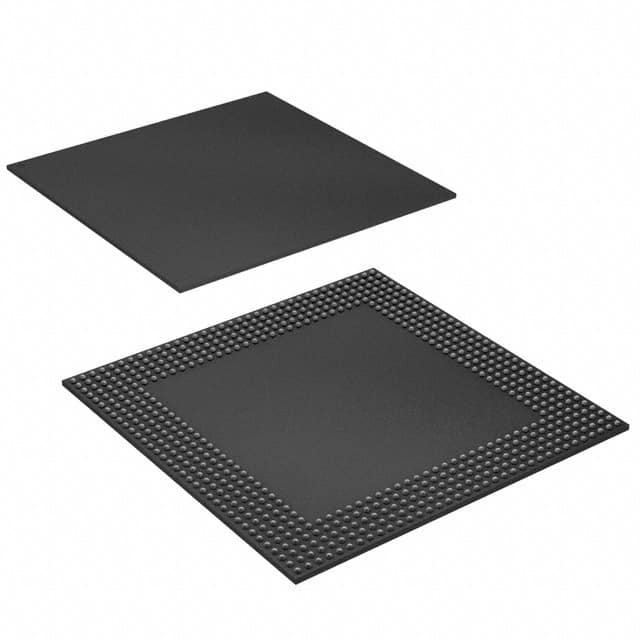EPF10K200EBI600-2
Product Overview
Category: Programmable Logic Device (PLD)
Use: The EPF10K200EBI600-2 is a high-performance PLD designed for various digital logic applications. It offers flexible programmability and advanced features, making it suitable for a wide range of electronic systems.
Characteristics: - High-density integration - Low power consumption - Fast performance - Extensive I/O capabilities - Versatile programming options
Package: The EPF10K200EBI600-2 comes in a compact and durable package, ensuring easy handling and protection against external factors such as moisture and static electricity.
Essence: This PLD is built to provide efficient and reliable digital logic functionality, enabling designers to implement complex circuits with ease.
Packaging/Quantity: Each EPF10K200EBI600-2 unit is packaged individually and is available in various quantities depending on the manufacturer's specifications.
Specifications
- Maximum Gates: 200,000
- Number of Macrocells: 1,536
- Operating Voltage: 3.3V
- Speed Grade: -2
- Package Type: BGA (Ball Grid Array)
- Package Pins: 600
- Temperature Range: -40°C to +85°C
Detailed Pin Configuration
The EPF10K200EBI600-2 has 600 pins arranged in a specific configuration. Please refer to the datasheet or manufacturer's documentation for the detailed pinout diagram.
Functional Features
- Flexible Logic Blocks: The device consists of multiple logic blocks that can be programmed independently, allowing for versatile circuit design.
- Embedded Memory: The PLD includes embedded memory blocks, providing additional storage capacity for data processing.
- Clock Management: It offers advanced clock management features, including phase-locked loops (PLLs) for precise timing control.
- I/O Flexibility: The device supports a wide range of input and output standards, enabling seamless integration with other components.
Advantages and Disadvantages
Advantages: - High-density integration allows for complex circuit implementation in a single device. - Low power consumption contributes to energy-efficient designs. - Fast performance enables rapid data processing and response times. - Versatile programming options offer flexibility in circuit design.
Disadvantages: - Limited availability of alternative models may restrict design choices. - Higher cost compared to simpler programmable logic devices. - Steeper learning curve for beginners due to the complexity of the device.
Working Principles
The EPF10K200EBI600-2 operates based on the principles of field-programmable gate arrays (FPGAs). It consists of configurable logic blocks interconnected through programmable routing resources. These logic blocks can be programmed to implement various digital functions, allowing designers to create custom circuits.
The PLD utilizes a combination of look-up tables, flip-flops, and interconnect resources to achieve the desired functionality. The configuration of these elements is determined by the user's programming instructions, which are stored in non-volatile memory within the device.
Detailed Application Field Plans
The EPF10K200EBI600-2 finds applications in a wide range of industries and electronic systems, including but not limited to: - Telecommunications - Industrial automation - Automotive electronics - Consumer electronics - Medical devices - Aerospace and defense
Its high-performance capabilities and flexible programming options make it suitable for applications requiring complex digital logic processing.
Alternative Models
While the EPF10K200EBI600-2 offers unique features and specifications, there are alternative models available in the market that cater to different requirements. Some notable alternatives include: - Xilinx Virtex UltraScale+ - Intel Cyclone V - Lattice ECP5
These alternative models provide similar functionality and can be considered based on specific project needs.
In conclusion, the EPF10K200EBI600-2 is a high-performance programmable logic device with versatile features and flexible programming options. Its integration capabilities, low power consumption, and extensive I/O make it suitable for various digital logic applications across different industries.
Senaraikan 10 soalan dan jawapan biasa yang berkaitan dengan aplikasi EPF10K200EBI600-2 dalam penyelesaian teknikal
Sure! Here are 10 common questions and answers related to the application of EPF10K200EBI600-2 in technical solutions:
1. What is EPF10K200EBI600-2? EPF10K200EBI600-2 is a specific model of Field Programmable Gate Array (FPGA) manufactured by Intel. It is designed for use in various technical solutions that require programmable logic capabilities.
2. What are the key features of EPF10K200EBI600-2? Some key features of EPF10K200EBI600-2 include 200,000 usable gates, 600 MHz maximum operating frequency, 2.5V core voltage, and support for various I/O standards.
3. In what applications can EPF10K200EBI600-2 be used? EPF10K200EBI600-2 can be used in a wide range of applications such as telecommunications, industrial automation, medical devices, automotive systems, and high-performance computing.
4. How can EPF10K200EBI600-2 be programmed? EPF10K200EBI600-2 can be programmed using hardware description languages (HDLs) like VHDL or Verilog. Design files are written in these languages and then synthesized, placed, and routed onto the FPGA using specialized software tools.
5. Can EPF10K200EBI600-2 be reprogrammed after deployment? Yes, EPF10K200EBI600-2 is a field-programmable device, which means it can be reprogrammed even after it has been deployed in a system. This flexibility allows for iterative design changes and updates.
6. What are the advantages of using EPF10K200EBI600-2 in technical solutions? Some advantages of using EPF10K200EBI600-2 include its high gate count, fast operating frequency, low power consumption, and the ability to implement complex logic functions in a single chip.
7. Are there any limitations or considerations when using EPF10K200EBI600-2? Some considerations when using EPF10K200EBI600-2 include the need for specialized programming skills, potential resource limitations due to the device's gate count, and the requirement for external support components like voltage regulators.
8. Can EPF10K200EBI600-2 interface with other components or devices? Yes, EPF10K200EBI600-2 can interface with other components or devices through its I/O pins. It supports various I/O standards such as LVCMOS, LVTTL, and SSTL, allowing for easy integration into different systems.
9. What kind of development tools are available for EPF10K200EBI600-2? Intel provides development tools like Quartus Prime software suite for designing, simulating, and programming EPF10K200EBI600-2. These tools offer a comprehensive environment for FPGA development.
10. Where can I find more information about EPF10K200EBI600-2? You can find more detailed information about EPF10K200EBI600-2, including datasheets, application notes, and reference designs, on Intel's official website or by contacting their technical support team.


